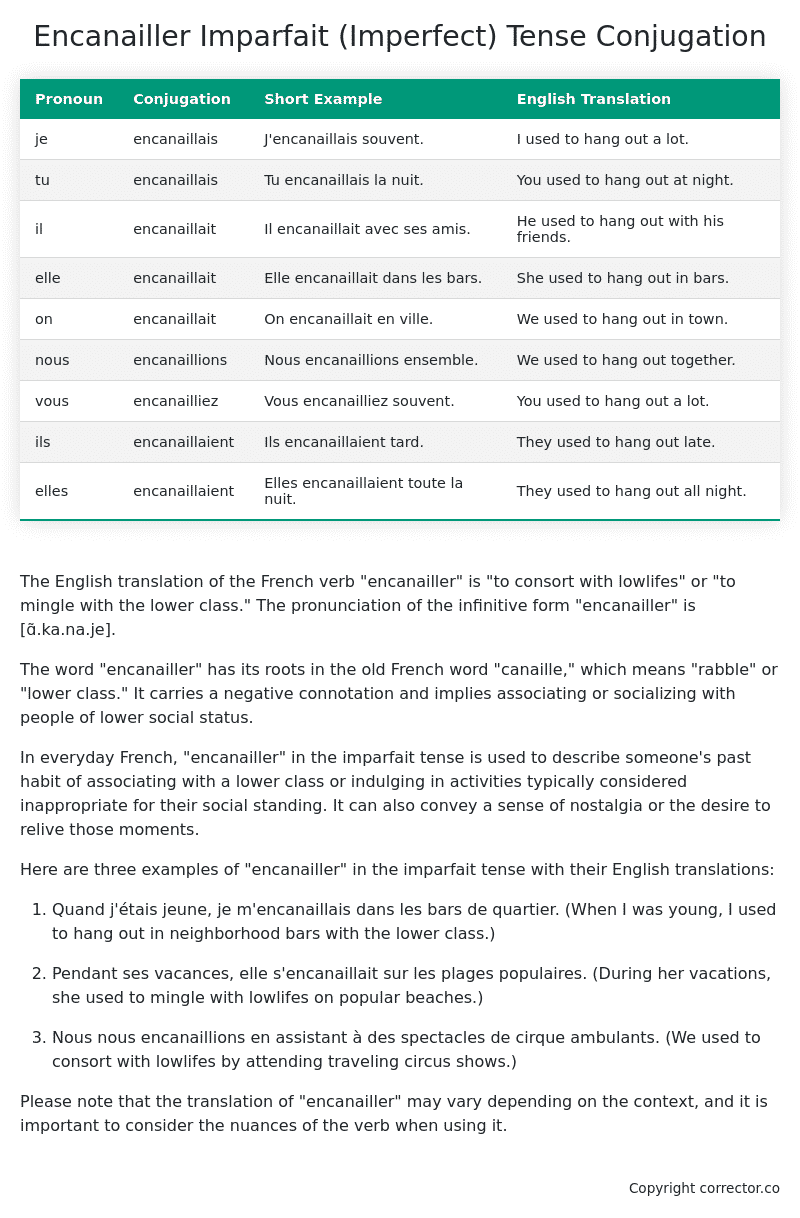Imparfait (Imperfect) Tense Conjugation of the French Verb encanailler
Introduction to the verb encanailler
The English translation of the French verb “encanailler” is “to consort with lowlifes” or “to mingle with the lower class.” The pronunciation of the infinitive form “encanailler” is [ɑ̃.ka.na.je].
The word “encanailler” has its roots in the old French word “canaille,” which means “rabble” or “lower class.” It carries a negative connotation and implies associating or socializing with people of lower social status.
In everyday French, “encanailler” in the imparfait tense is used to describe someone’s past habit of associating with a lower class or indulging in activities typically considered inappropriate for their social standing. It can also convey a sense of nostalgia or the desire to relive those moments.
Here are three examples of “encanailler” in the imparfait tense with their English translations:
-
Quand j’étais jeune, je m’encanaillais dans les bars de quartier.
(When I was young, I used to hang out in neighborhood bars with the lower class.) -
Pendant ses vacances, elle s’encanaillait sur les plages populaires.
(During her vacations, she used to mingle with lowlifes on popular beaches.) -
Nous nous encanaillions en assistant à des spectacles de cirque ambulants.
(We used to consort with lowlifes by attending traveling circus shows.)
Please note that the translation of “encanailler” may vary depending on the context, and it is important to consider the nuances of the verb when using it.
Table of the Imparfait (Imperfect) Tense Conjugation of encanailler
| Pronoun | Conjugation | Short Example | English Translation |
|---|---|---|---|
| je | encanaillais | J’encanaillais souvent. | I used to hang out a lot. |
| tu | encanaillais | Tu encanaillais la nuit. | You used to hang out at night. |
| il | encanaillait | Il encanaillait avec ses amis. | He used to hang out with his friends. |
| elle | encanaillait | Elle encanaillait dans les bars. | She used to hang out in bars. |
| on | encanaillait | On encanaillait en ville. | We used to hang out in town. |
| nous | encanaillions | Nous encanaillions ensemble. | We used to hang out together. |
| vous | encanailliez | Vous encanailliez souvent. | You used to hang out a lot. |
| ils | encanaillaient | Ils encanaillaient tard. | They used to hang out late. |
| elles | encanaillaient | Elles encanaillaient toute la nuit. | They used to hang out all night. |
Other Conjugations for Encanailler.
Le Present (Present Tense) Conjugation of the French Verb encanailler
Imparfait (Imperfect) Tense Conjugation of the French Verb encanailler (You’re reading it right now!)
Passé Simple (Simple Past) Tense Conjugation of the French Verb encanailler
Passé Composé (Present Perfect) Tense Conjugation of the French Verb encanailler
Futur Simple (Simple Future) Tense Conjugation of the French Verb encanailler
Futur Proche (Near Future) Tense Conjugation of the French Verb encanailler
Plus-que-parfait (Pluperfect) Tense Conjugation of the French Verb encanailler
Passé Antérieur (Past Anterior) Tense Conjugation of the French Verb encanailler
Futur Antérieur (Future Anterior) Tense Conjugation of the French Verb encanailler
Subjonctif Présent (Subjunctive Present) Tense Conjugation of the French Verb encanailler
Subjonctif Passé (Subjunctive Past) Tense Conjugation of the French Verb encanailler
Subjonctif Imparfait (Subjunctive Imperfect) Tense Conjugation of the French Verb encanailler
Conditionnel Présent (Conditional Present) Tense Conjugation of the French Verb encanailler
Conditionnel Passé (Conditional Past) Tense Conjugation of the French Verb encanailler
Conditionnel Passé II (Conditional Past II) Tense Conjugation of the French Verb encanailler
L’impératif Présent (Imperative Present) Tense Conjugation of the French Verb encanailler
L’impératif Passé (Imperative Past) Tense Conjugation of the French Verb encanailler
L’infinitif Présent (Infinitive Present) Tense Conjugation of the French Verb encanailler
L’infinitif Passé (Infinitive Past) Tense Conjugation of the French Verb encanailler
Le Participe Présent (Present Participle) Tense Conjugation of the French Verb encanailler
Le Participe Passé (Past Participle) Tense Conjugation of the French Verb encanailler
Struggling with French verbs or the language in general? Why not use our free French Grammar Checker – no registration required!
Get a FREE Download Study Sheet of this Conjugation 🔥
Simply right click the image below, click “save image” and get your free reference for the encanailler imparfait tense conjugation!

Encanailler – About the French Imparfait Tense
NOTE: To take a deep dive into all the French tenses then see our article on Mastering French Tense Conjugation.
Formation of the Imparfait Tense
For regular -er verbs:
For regular -ir verbs
For regular -re verbs
Common Everyday Usage Patterns
Description of Past Habits
Background Information
Mental and Emotional States
It’s employed to express emotions, thoughts, or physical sensations in the past. For example: “J’étais content quand il est arrivé.” (I was happy when he arrived.)
Ongoing Actions
Points to Note About the Imparfait Tense
Passé Composé vs. Imparfait
Conditional
Si Clauses
Narration
I hope you enjoyed this article on the verb encanailler. Still in a learning mood? Check out another TOTALLY random French verb imparfait conjugation!


